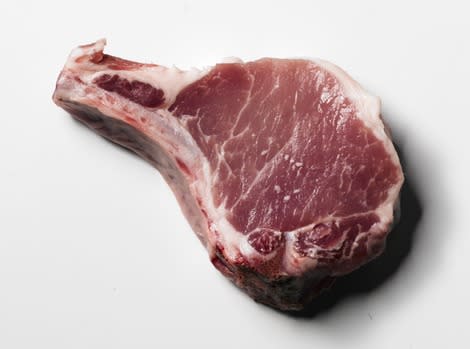How Much Protein Do You Really Need?
By: K. Aleisha Fetters


"It's not a meal unless it includes protein," says health and fitness-certified specialist, Jim White, R.D., owner of Jim White Fitness & Nutrition Studios. Plus, more protein means more muscle, right? Yes, until it also means kidney stones, abdominal surgery, and heart disease. Yikes.
It turns out the risks of going overboard on protein have less to do with simply eating too many unnecessary grams of the macronutrient and more about ODing on the foods that pack it-and forgoing the ones that don't.
7 Childhood Actors Who Made It Big
Why? Most people think protein means meat and animal products. While that can be a good thing as far as muscle building is concerned (they're "complete" protein sources, meaning they pack all of the amino acids your body needs), they also tend to be high, or at least higher than plant-based sources, in saturated fat, White says. Excessive amounts can lead to a ballooning belly, diabetes (even if you somehow stay thin), and an increased risk of heart disease.
Plus, those meats and animal products increase your urine's calcium content and contain compounds called purines, which break down into uric acid to form kidney stones, according to the National Institutes of Health. To add insult to injury, diets high in protein often lack the fiber from fruits, vegetables, and whole grains that's needed to keep things moving down there, resulting in backed-up bowels and even diverticulitis, which often requires surgery to fix.
5 Common Cold and Flu Facts & Myths
But that's only if you overeat your meat, so just how much is too much? For most men, the Centers for Disease Control and Prevention recommends a daily dose of 56 grams-that means about 10 to 35 percent of your daily calories should come from the protein (it contains 4 calories per gram). The rest should come from healthy carbs and fats.
Still, since the average Joe is more couch potato than gym nut, you probably need more protein than he does. If you're vying for power (strength or speed), White advises eating 1.2 to 1.7 grams per kilogram of your body mass each day. If a marathon or tri is more your thing, 1.2 to 1.4 grams per kilogram of your body mass will do the trick. For a 160-pound guy who's hitting the gym on the regular, that's about 87 to 123 grams of protein a day. While the Institute of Medicine's Food and Nutrition Board hasn't released a definitive "Tolerable Upper Intake Level" for protein, it's safe to say that even if you moonlight as an elite athlete, you don't need the one gram per pound of body weight that some no-neck lifters advocate.
Foods That Will Make You Look Younger
Perhaps even more important than your total protein consumption, though, is when and how you get it. White suggests choosing lean, high-quality (think: fresh, grass-fed, organic, etc.) meats and a variety of both animal- and plant-based proteins like milk, yogurt, beans, quinoa, nuts, and kale that contain other good-for-you nutrients. As far as muscle building is concerned, he says to eat them after-not before-your sweat sesh. "Studies have shown that for muscle building, the optimal time for a recovery meal or snack including protein is within 30 to 45 minutes after the workout," he says.
And even if today is exercise-free, you still need to eat protein for constant muscle synthesis and a better, faster, stronger metabolism.
More from DETAILS:
5 Surprising Facts About Sleep
14 Healthiest Snack Foods You Can Buy
5 Weird Signs You're Vitamin Deficient
